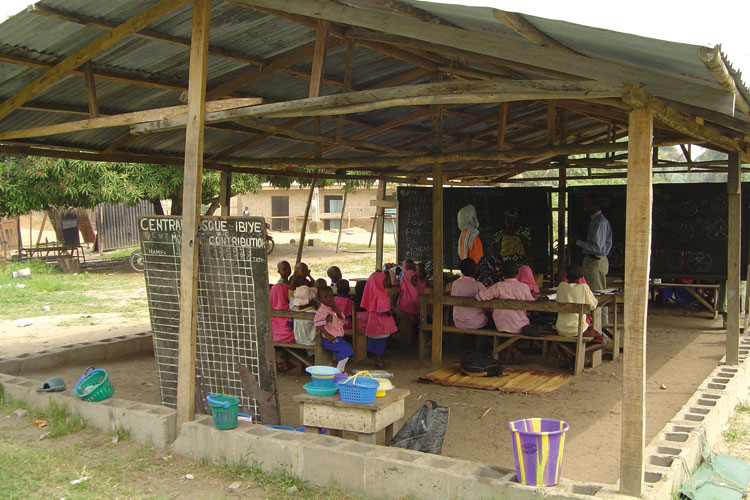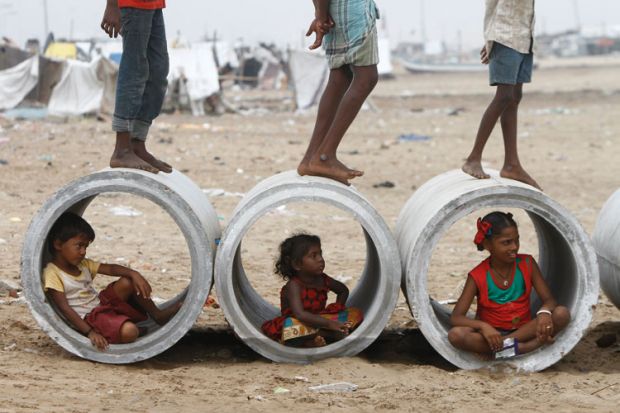It was the very logic of his research that took James Tooley to the outer limits – and eventually landed him in an Indian jail.
Now professor of education policy at Newcastle University, Tooley started life as a socialist. While doing a PhD at what is today the UCL Institute of Education, however, he “looked at the justifications for government’s involvement in [every level of] education and found them all unconvincing”. This led him to “come out in favour of private education” and, in 1995, to set up an education unit at the Institute of Economic Affairs – the free-market thinktank that had enjoyed something of a vogue during the Thatcher era – and to produce reports such as Education without the State (1996).
Although he was convinced on philosophical grounds, Tooley remained concerned that “everybody knew private education was for the rich and the elite”. The real question, for someone committed to widening educational opportunity, was whether private low-cost schools could work in developing countries and attract support and fees from some of the poorest parents on the planet.
It was in 2000, as he reports in his 2009 memoir, The Beautiful Tree: A Personal Journey into How the World’s Poorest People Are Educating Themselves, that Tooley began to find out for himself. He was working in India on a consultancy project for the International Finance Corporation (the private-sector arm of the World Bank) looking at elite private colleges. On a day off, he set out to explore the slums of Hyderabad, found just the kinds of schools he had hoped to find and experienced “a genuine epiphany – I came back to my hotel and thought ‘I now know what I want to do with my life’”.
The Beautiful Tree describes a journey that took him “to battle-scarred townships in Somaliland; to shantytowns built on stilts above the Lagos lagoons in Nigeria; to India again, to slums and villages across the country; to fishing villages the length of the Ghanaian coastline; to the tin-and-cardboard huts of Africa’s largest slums in Kenya; to remote rural villages in the poorest provinces of northwestern China; and back again to Zimbabwe [where he had his ‘first real job’ as a maths teacher in 1980], to its soon-to-be bulldozed shantytowns.”
Since national governments and development experts often downplayed the importance or even denied the existence of the schools he was interested in, Tooley found himself venturing well off the beaten track to find them. In the Makoko slum near Lagos, for example, his book describes how he and his driver abandoned their car on an “impassable” road and “picked our way carefully. The street was flooded from the previous night’s rains. The open sewers along either side had spilled out into the road; I followed my driver, squelching my way from one side of the street to the other, avoiding the worst excesses of slime and mud, human excrement, and piled rubbish.
“In Makoko, you must go beyond the public schools on the outskirts, beyond the paved road into unknown and forbidding territory. If everyone tells you that there are no such schools beyond, and it’s a threatening place, why would you bother to go and look for yourself? To find the private schools, you really must get your boots dirty. Not everyone is prepared to do that.”
Tooley is now a passionate advocate for low-cost private schools in poor countries, and he serves as patron of the Association of Formidable Educational Development in Nigeria. He explains that his work involves supporting curriculum development, assessment and money-raising efforts; the schools are “funded by parental fees and sustainable at the individual level but can’t fund teacher training”.
He also co-funded the Omega Schools Franchise, a chain of low-cost, for-profit schools in Ghana. Tooley says he does not draw a salary from this venture and has put his “life savings in to test the model”. The chain has “gone from none to 40 schools in four to five years. I raised investment from Pearson [via the educational firm’s Affordable Learning Fund] while taking three years’ unpaid leave from the university, so I was involved on the ground as a sort of non-executive chairman.” Tooley is also attached to similar projects in India and elsewhere.
The fundamental case for low-cost private education, needless to say, remains highly contentious.
In April 2014, the Department for International Development published a “rigorous literature review” titled The Role and Impact of Private Schools in Developing Countries, led by researchers at the University of Birmingham and the Institute of Education. The review confirmed some of Tooley’s arguments, citing “strong evidence” that “teaching is better in private schools than in state schools, in terms of higher levels of teacher presence and teaching activity”, and “moderate evidence” that “private school pupils achieve better learning outcomes”. The review’s authors were far less convinced that such schools perform as well in terms of affordability, financial sustainability and gender equity, leading to much fierce debate between them and Tooley.
Critics have also suggested that most of the countries that he surveys in The Beautiful Tree are not among the world’s very poorest and that his arguments may not apply everywhere.
He was happy to take up the challenge. “I liked the idea of [discovering]: what is the outer limit of private education? It certainly serves the poor in Ghana, India and Kenya, but does it serve them in the world’s poorest countries?” Tooley secured support from the John Templeton Foundation – which funds projects on free-market solutions to poverty as well as, more famously, “civil, informed dialogue among scientists, philosophers and theologians” – to look at private schooling in Liberia, Sierra Leone and South Sudan.

“I am never very well prepared,” he admits of his travel plans. “All I do is look on the internet to find the location of the poorest slums and ask taxis to take me there. You just walk down the alleyways and find these schools in cities such as Monrovia [in Liberia].”
But although others have suggested that he is brave to venture into slums that even locals avoid, Tooley reports that “it was completely safe; you get looked after in those places.
“The only time I am afraid is going through customs and immigration, because people are always after bribes. I’ve never had problems in the poor areas. The fear never lies in the slums, though people say it looks dangerous.” To get himself across borders while carrying large quantities of cash, he sometimes adopts the persona of “the innocent stupid foreigner”, responding to officials’ requests to make them happy by offering to sing to them.
So has Tooley’s approach ever got him into trouble? The hairiest episode in The Beautiful Tree concerns the time that he and the proprietor of a private school were aggressively interrogated in “dingy underground windowless security offices” by “the regional head of security” in a small Zimbabwean town. Things were beginning to get nasty, with Tooley accused of being a typically British “colonial racist”, only for them suddenly to be released when it turned out that the regional chairman of the Zanu-PF (Robert Mugabe’s ruling party since independence) had a daughter in the proprietor’s school and was even the chair of the parent-teacher association.
Yet far worse than this brief scare was what happened to Tooley in Hyderabad last year.
His ordeal started in March, when a deputy superintendent of the Crime Investigation Department turned up at his hotel one evening for what seemed like a friendly chat. There was no suggestion that he was under suspicion, and he guessed that she might be angling to get a university place for her son at Newcastle. But at 1am he was arrested, brought to CID headquarters and kept waiting in a library. His lawyer arrived the next day, couldn’t work out what was going on and tried to get him to court to secure bail before the weekend, but the superintendent delayed matters by insisting that Tooley needed a health check first.
Since Tooley was stressed after 14 hours in custody without food or sleep, his blood pressure revealed that he was at risk of a heart attack or stroke, so he was kept in hospital overnight before being taken to a judge’s house. There, he explains, he was accused of a minor infraction of foreign currency regulations for which the normal penalty was the equivalent of a speeding ticket. He was nonetheless sent to prison – with nothing but the clothes he was wearing and a biography of Gandhi.
“I arrived at my cell,” he recalls, “nine foot square, where foreigners were put while they decided what to do with them – and there were three piles of shit. I was put there with nothing and locked up. Cell No. 13.”
Since he was too late for the day’s rations of food and drink, the prisoners across the corridor found him “bread, jam, orange, apple and a blanket. At risk to themselves they called a jailer and transferred them across to my cell. I’ll never forget the kindness of other prisoners. And I looked after others in turn and started a chess club.”
Although the jailers pushed him around and beat others up in his presence, Tooley was befriended and helped by murderers, drug offenders and prisoners who claimed to be innocents – many held pre-charge on the basis of police allegations as “undertrials”, awaiting bail or unable to afford it. He was fortunate enough to have a friend acting on his behalf and, after a week, was released by a court on bail.
Yet even then the episode was far from over, because the authorities retained his passport and required him to come in for interrogations twice a month. He remained extremely frightened, well aware he could always be re-arrested, and felt increasingly isolated and depressed, since he was keen not to contact and thereby implicate his friends. After his first petition to get his passport back failed, he was eventually stuck in India for four months, deeply worried about work, money and his mortgage. Reading Franz Kafka’s The Trial for the first time while he was there “felt like the reality I was in…Nothing made any sense at all.”
The interrogators were aggressive and, on one occasion, referred to chapter eight of The Beautiful Tree, which describes corruption in Hyderabad. Tooley had been involved in setting up schools trusts that, he says, almost inevitably breach some minor regulation, so he was known to the authorities and was thus an obvious target for someone looking for a backhander.
Although others have suggested that there was a political motive behind what happened to him – anyone attacking state education is bound to make enemies – Tooley has no evidence for this. Traumatised by his experiences, he has understandably cut back on travel, yet he fully intends to return to the site of his original epiphany. “I’m not afraid of going back to India – nothing had happened to me before in 20 years.”
